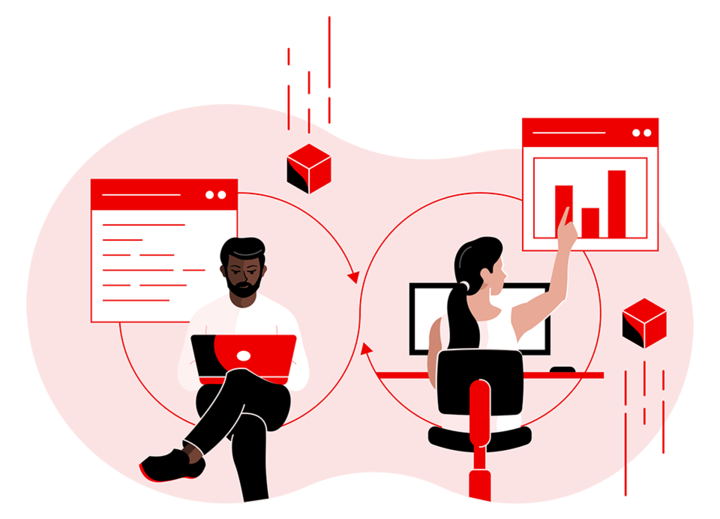Digital transformation today is intertwined with processes and tools that foster speed, agility, flexibility, and experimentation. “The goal of digital transformation is to evolve a business to compete in a digital landscape,” says Helen Beal, chief ambassador for DevOps Institute. “This necessitates becoming a technology- or software-led business.”
That’s why DevOps and digital transformation go hand in hand.
DevOps emerged more than a decade ago, borrowing a page from the manufacturing industry. Instead of focusing on the discrete and — for many years, disparate — tasks involved in the development and ongoing operations of software, DevOps took a more integrated product-centric approach that eliminated a significant amount of overhead and rework and improved quality, speed, and overall outcomes.
How DevOps helps with digital transformation goals
The processes and tools involved in DevOps certainly accelerate the digital journey on a number of fronts, as we recently reported. Consider these additional benefits:
[ Are your digital transformation metrics up to date? Read also: 10 digital transformation metrics to measure success in 2021. ]
1. DevOps supports the shift to product-centricity
“In the quest for organizational nimbleness, many companies are moving toward product operating models and empowered product teams,” says Peter A. High, author of Getting to Nimble: How to Transform Your Company into a Digital Leader and president of the technology and business advisory firm Metis Strategy. “DevOps enables those teams by providing them with the means to get new ideas and features to market quickly, to gauge and react to customer feedback in days and weeks instead of months and quarters, and minimizes risk in deployment and cybersecurity.”
2. DevOps teams use varied application portfolios
A large organization with many applications developed in varied technologies and languages most often willnot find it feasible or economically viable to standardize their portfolio into one language. “DevOps has evolved over the past few years, and technologies have evolved to bring DevOps methods and its automations to a wide variety of languages and systems,” says Venky Chennapragada, DevOps architect at Capgemini North America. “This has enabled many enterprises to make good progress in their digital transformation.”
3. DevOps fuels better customer experiences
The key here is the automation that’s baked into processes. “DevOps toolchains provide the capability to deliver value quickly and safely. They support the goal of continually delivering value outcomes to customers,” says Beal of DevOps Institute. The processes are cyclical; service desk tickets and data feed new requirements and user stories. “All this makes the customer key,” says Beal. “If we provide sublime customer experience that delights, organizational performance follows.”
[ Get exercises and approaches that make disparate teams stronger. Read the digital transformation ebook: Transformation Takes Practice. ]
4. DevOps can help people bust silos
DevOps aims to deliver the functionality required to deliver business outcomes. “Traditional IT has a hit or miss track record in this area for several reasons,” says Andy Sealock, senior director in the advisory and transformation practice at business and technology consultancy West Monroe, “but chief among them is an initial misunderstanding of what the customer need actually is.”
A DevOps-driven organization brings together product engineers, product owners, customer champions, and IT staff. “By doing so, it breaks down cultural norms and functional silos so that everyone can tap into customer needs and apply them to the product, ensuring that all activity progresses toward maximizing customer value,” Sealock explains.
5. DevOps helps managers evolve into coaches
Leadership and management is shifting in the dynamic digital age. DevOps, by nature, helps to transition leaders from managers to coaches, says Beal. IT also helps them embed dynamic learning capabilities and psychological safety into the organization, she adds.
6. DevOps (and DevSecOps) embed security throughout systems lifecycles
“Security is paramount for businesses as technical systems are more exposed than ever in today’s cloud-driven ecosystem,” says Sealock of West Monroe. Automated security tests and scans, escalated code reviews for critical security features, and the “shift left” process mentality enable the integration of security without sacrificing agility.
[ Need to explain key Agile and DevOps terms to others? Get our cheat sheet: DevOps Glossary. ]
7. DevOps helps teams scale advanced analytics and AI
Specifically, ModelOps can operationalize advanced analytics, and DataOps can help organizations build iterative data pipelines, says Tapan Patel, senior marketing manager for AI and Cloud at SAS. Both encourage the creation of data and analytics awareness, skills, and communities.
To build success in these areas, CIOs should allow teams to choose DevOps practices to deliver analytics and AI initiatives at a frequent cadence to remain agile and meet customer demand, Patel says. “but [they should] do so with relevant guardrails to ensure that governance needs are met.”
8. DevOps helps improve productivity
DevOps can be a catalyst for the internal changes necessary to deliver on the promise of digitalization — streamlined efficiency. DevOps has an organizational structure that encourages continuous learning and improvement, processes that are efficient and scalable, and automation technologies that greatly improve productivity by eliminating manually intensive, lower value activities, says Sealock of West Monroe.
9. DevOps plays nicely in hybrid cloud environments
The vast majority of organizations have some applications in the cloud and other legacy apps on-prem for technical, business, or financial reasons. Business processes have dependencies on both types of systems. DevOps methods and pipelines can orchestrate the continuous deployment of apps within hybrid environments, according to Chennapragada of Capgemini North America.
Newer DevOps tools may help teams provision resources across both cloud and on-premises systems to enable CI/CD across the portfolio.
10. DevOps factors in user adoption early
A digital initiative is only valuable if users accept new systems and processes. DevOps builds understanding of user needs and adoption into the process through end user analytics, explains Sealock. As a result, it gives digital transformation efforts a leg up in the time-to-value department.
[ Culture change is the hardest part of digital transformation. Get the digital transformation eBook: Teaching an elephant to dance. ]






